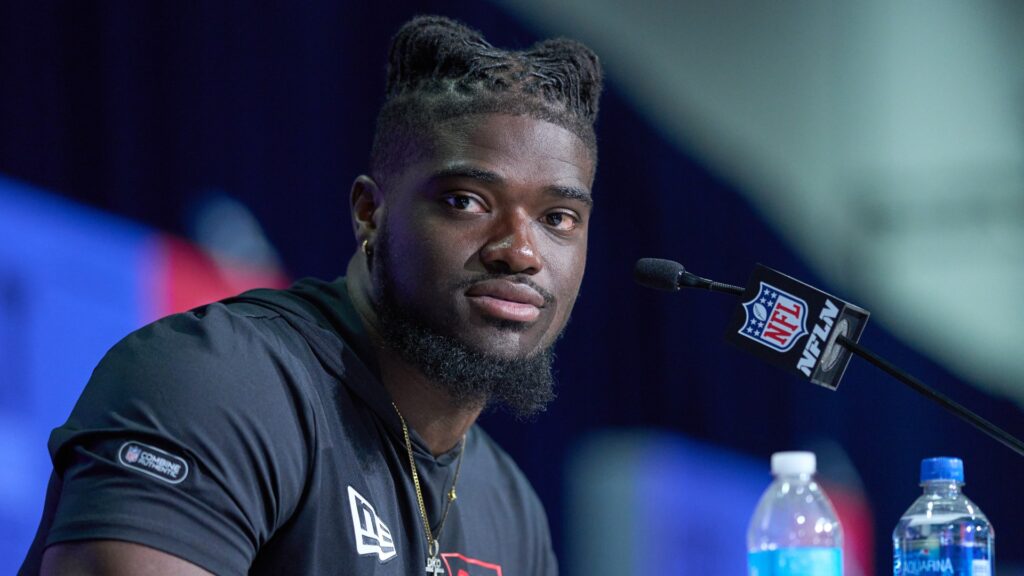Viral clip Ojabo’s injury shows the cold-blooded reality of the NFL

By DERON SNYDER (as published by theGrio)
A 21-second clip can teach you a lot about the NFL, even if it’s only a player working out in shorts.
Prior to Friday, University of Michigan linebacker David Ojabo was considered a possible top-10 pick in next month’s draft. Then he suffered a devastating Achilles injury while performing exercises in front of NFL scouts at his school. Suffice it to say he’s no longer viewed as a top-10 pick, thanks to a chilling moment captured on video.
Ojabo goes down about eight seconds into the clip and grabs his lower left leg. As he rolls on the ground, wincing and writhing in pain, only one onlooker makes a move. That dude walks ever so slowly toward Ojabo … before veering to pass him and retrieve the football. He slowly walks past Ojabo again, barely looking at the 6-foot-5, 225-pound young man who’s in obvious distress.
If you didn’t know, now you know. That short video sums up the NFL’s sensibilities and reminds anyone who forgot.
“I know the NFL is a cold business but watching the lack of concern or empathy from the scouts, coaches and observers following David Ojabo’s injury bugs me,” tweeted Bucky Brooks, an NFL broadcaster and former player. “Perhaps someone should’ve checked on him instead of grabbing the ball and moving to the next drill. Just a thought.”
Not surprisingly, a former team doctor totally missed the point, believing that only trained professionals can be of assistance. “I get this is a bad look,” tweeted David J. Chao, who once worked for the San Diego Chargers. “But the NFL is so specialized, it is the job of the [Certified Athletic Trainer] to run check on him. That is what happens to star players on game day too.”
Doc should keep a low profile based on his raggedy past. The Ojabo lesson isn’t about whose “job” includes checking on an injured player. That’s not listed among teammates’ responsibilities, yet they’ll comfort a fallen colleague on the game days that Chao mentions.
Like the coaches and scouts who didn’t make a move, most of us aren’t doctors or trainers, either. But we would’ve responded to Ojabo’s pain for a simple reason.
We see humanity where the NFL sees commodities.
Medical personnel attended to Ojabo shortly afterward, but they’re conditioned to put teams’ interests ahead of – or alongside of – players’ interest. The attitude of coaches and scouts in attendance was illustrative, triggering memories. Cornerback Darius Slay and former linebacker Will Compton shared stories of sustaining injuries that received scant attention during practice. Compton said the next play occurred right where he lay on the ground; Slay said at least the ball was moved up 10 yards.
Almost immediately, the conversation about Ojabo went from his injury to how it might impact his future. Teams that select lower in the draft undoubtedly were heartened, thinking he might “fall” to them and become a steal. One scouting director told Yahoo Sports that Ojabo could drop “20 spots or more.”
Too many fans and media members criticize players who skip college bowl games to prepare for the draft, or decline every single opportunity to work out for NFL teams, or stage holdouts during training camp in search of a better contract. Such players are called selfish and labeled as bad teammates. They’re accused of playing for financial reasons instead of “love of the game.”
But let those same players suffer a career-ending injury and their work relationships suddenly become clear. “Love of the player” is strictly conditional in hiring and retention practices.
Teams are only loyal to George Washingtons and Benjamin Franklins. Pats on the back can turn into knives once players start slipping – or earlier when it suits the team. It doesn’t even matter if high-performing stars love their franchise and are entrenched in the community. They’re subject to be traded, heartbroken or not.
Keep that in mind the next time sometime whines about pro athletes and soon-to-be pros looking out for themselves.
Yes, they make a lot more dough than average workers. But management in sports can be as cold and callous as management at Wal-Mart and Amazon. There’s nothing romantic about it.
Ask Ojabo.
 Follow
Follow
